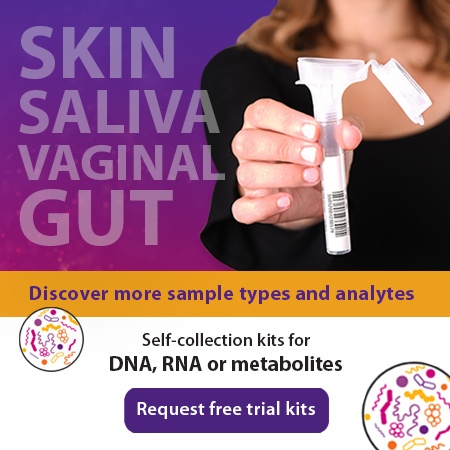2021-03-18
For those of us working in the microbiome space, after the gut microbiome exploded onto the scene in the early 2000’s, it was clear that the skin microbiome was not far behind. The subject of the skin microbiome even made it onto all our television screens back in 2019 when a well-known body wash manufacturer released a commercial asking: “Is your body wash gentle on your microbiome?”. Participants were then quick to question what, in fact, the “microbiome” is. At the same time, we at DNA GenotekTM were actively working on the development of our most recently released product, OMNIgene•SKIN (research-use only). This collection device helps standardize and streamline the collection of microbial DNA from human skin of all types (dry, wet and sebaceous). As the product manager in charge of the OMNIgene•SKIN project, the concept of skin microbiome already becoming mainstream was promising.
So, why should we care about the health of our skin microbiome and why is the beauty industry bringing attention to this topic? I explore these subjects in the following article.
Skin microbiome research – Poised for a revolution?
In the spring of 2019, I attended the Keystone Symposia Conference Skin Health and Disease: Immune, Epithelial and Microbiome Crosstalk to learn more about the state of fundamental research in the skin microbiome space. As an outside observer, there were 2 major takeaways from this conference that I thought were very telling of what was coming next in this specific field of research:
- We cannot underestimate the pivotal role that skin plays in the body’s immune responses
Just as in our gut, there are millions of bacteria living on our skin surface and within our pores. These bacterial communities are subjected to chemical and physical attacks all day long (e.g. personal hygiene products, makeup, clothing, detergents, pollution, etc.). If the skin microbiome is pushed to its limits, by either depleting “good bacteria” or encouraging the growth of “bad bacteria,” it may favour various skin disease states. For example, some cases of severe acne are hypothesised to be the result of an imbalance in the various Cutibacterium acnes strains that inhabit our skini. Our skin can also be a reflection of immunological responses happening elsewhere in our body. Eczema for example may in fact be the result of immune reactions happening at the gut microbiome level.ii The idea there is cross-talk between our various microbiomes is of course nothing new but the fact that we can observe some of the immunological reactions they modulate by looking in the mirror means there is increased awareness from the general public. - The term “microbiome” has a very different meaning in the world of skin health and disease research.
Although many scientists are keen to start sequencing samples collected from the skin of their study participants, the technology still isn’t widely used and researchers favour culturing as their means for analysis. The fact that skin microbiome sequencing is not yet widespread is likely only a matter of time. It may be in part due to a few technological challenges that are currently being addressed by scientists to make the collection, processing, and sequencing of skin samples both efficient and accurate. For the time being, skin microbiology remains focused on a few key micro-organisms which play a significant role in the most prevalent diseases - Cutibacterium acnes in the case of acne for example – which can be easily cultured in the lab.
This Keystone Symposia, along with many other skin microbiome events have made it clear that we are on the edge of a revolution in the skin microbiome research space.
New technologies are opening doors to researchers allowing them to explore skin microbial communities and immunological pathways more efficiently. This will undoubtedly help accelerate discoveries in this space and lead to more of this science overflowing into consumer’s day-to-day lives.
Beauty and personal care products –being shaped by the microbiome
Just as we saw the rise in popularity for probiotics that could help our gut microbes, many beauty start-ups now offer skin formulations containing prebiotics, probiotics and postbiotics to help “rebalance” the skin’s microbiome or fight bacteria thought to be associated with particular skin conditions. Companies like Yun Probiotherapy, MotherDirt, S-Biomedic, Esse Skincare, Gallinée (and the list goes on), all advocate that their formulations can help clear up problem skin and alleviate sensitive skin.
Not only are “microbiome friendly” formulations trending, but we are also seeing the rise in companies hoping to curate your skincare routine based on your individual skin profiles. For such companies, obtaining your skin microbiome profiles is likely to play a big role in the recommendations they make. In the fall of 2020, we profiled one such company, PureCulture Beauty, in an episode of our Molecules, Microbes and Multiomics Podcast and you can listen to that episode here: Personalized skin care: the beauty industry diving into the microbiome.
Is your skincare routine microbiome friendly?
From bespoke cosmetic companies to large multinational consumer product manufacturers, it seems everyone is interested in keeping our skin microbiomes happy. The beauty and personal care product market is expected to be worth over 500 billion US dollars in 2021iii. In the age of the internet, consumers can easily research the products they purchase making them smarter and more demanding from their preferred brands. Personal care product and cosmetics manufacturers are hearing this message loud and clear.
Still consumer and beauty products are not regulated the same way as drugs, giving manufacturers the liberty to make broad and potentially unsupported claims about the impact their products can have on the microbiome. One group trying to help consumers understand how products stand-up to the claims, is the team at Microbiome Friendly. Lead by microbiologist Kristin Neumann, Microbiome Friendly offers to test consumer products and provides a final score regarding their influence on the microbiomedamagingiv.
At the same time, companies such as Unilever, Procter & Gamble, Estée Lauder and L’Oreal are busy making the rounds sharing their years of microbiome research with the scientific community making it clear this is something that they’ve been working on for decades. It is to be expected that many more companies will make their data publicly available in the coming years as consumers continue to ask for more “proof” that the products aren’t hurting their friendly skin bugs.
What’s next for skin microbiome space?
Along with the emergence of new methods and technologies which will help accelerate skin microbiome research in the next few years, there is also one major new player which cannot be overlooked: COVID-19. As we are aware, the ongoing pandemic has affected almost every aspect of our daily lives. Since March 2020, we’ve all heeded the messages from our public health authorities to “wash our hands” and “wear our masks”. These practices are fantastic for keeping the coronavirus at bay but over-washing of hands, extreme use of sanitizers, and the constant wearing of face-coverings is exacerbating common skin disorders such as eczema and psoriasis and leading to the newly coined phenomenon of “maskne”v or mask acne.
Many consumers also adopted whole new skincare habits over the course of 2020 since their entire routines and lifestyles were flipped upside-down. It is expected that the pandemic and our new found hygiene practices will fuel a whole new set of research in the coming years. Many scientists will also find themselves needing to factor-in the impact of Covid-19 into their work, something we could never have foreseen back in 2019.
Related content: 4 critical considerations for collecting skin microbiome samples
If you’d like to learn more about DNA Genotek’s OMNIgene•SKIN product for skin microbiome sample collections or Diversigen’s skin microbiome sequencing and bioinformatics pipeline you email us at info@dnagenotek.com and Diversigen at info@diversigen.com. If you are interested in receiving free samples of OMNIgene•SKIN to try for your lab, click the photo below.
References:
i Dreno B et al. Cutibacterium acnes (Propionibacterium acnes) and acne vulgaris: a brief look at the latest updates. Journal of The European Academy of Dermatology and Venereology. 32(2) 5-14 (2018) DOI: 10.1111/jdv.15043
ii Thomas CL and Fernandez-Penas P. The microbiome and atopic eczema: More than skin deep. Australasian Journal of Dermatology. 58(1) 18-24 (2017) DOI: 10.1111/ajd.12435
iii https://www.statista.com/outlook/cmo/beauty-personal-care/worldwide
iv https://www.mymicrobiome.info/
v Teo WL. The “Maskne” microbiome – pathophysiology and therapeutics. International Journal of Dermatology. (2021) DOI: 10.1111/ijd.15425


